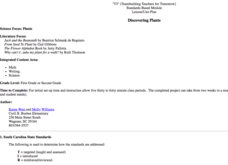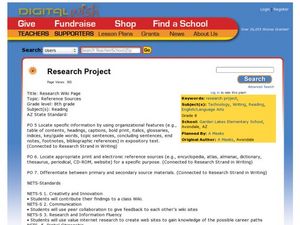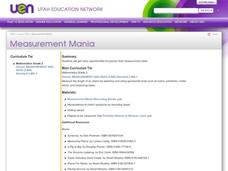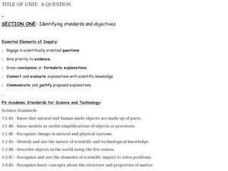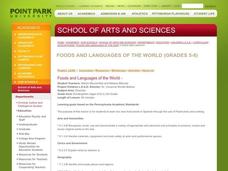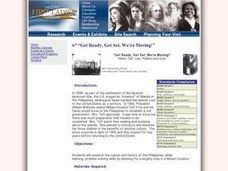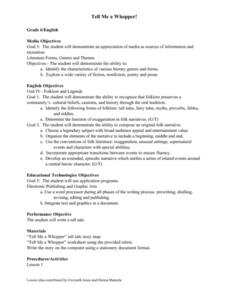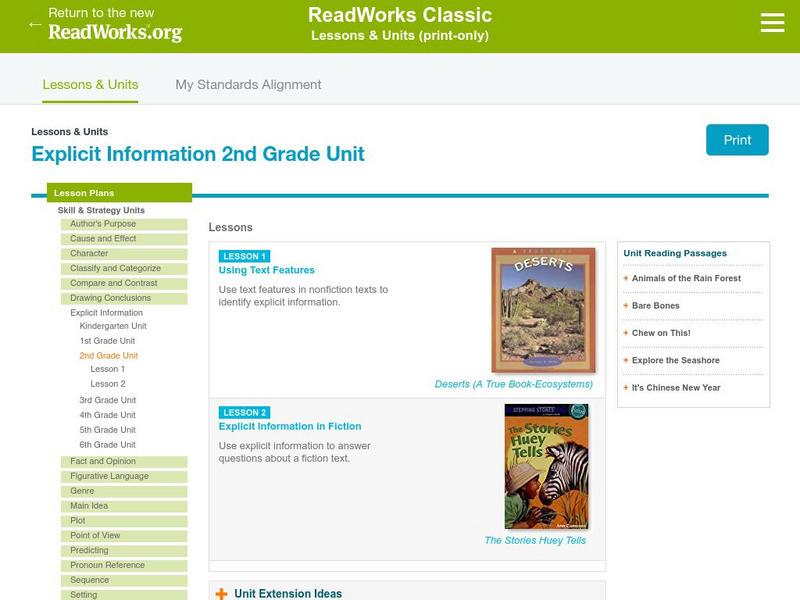Curated OER
Lesson Two: Rock N Rhythm & Rhyme (Part Two)
Second graders find rhythm and rhyme in poetry. In this poetry lesson, 2nd graders listen to different poems to find the rhyming words. They play a memory game and try to find two words that rhyme.
University of Southern California
Discovering Plants
Learners construct a small greenhouse and plant lima beans. They read books about plants, tend the lima bean seedlings, observe and record plant growth, taste a variety of plants and maintain plant journals.
Curated OER
Research Project
Students learn the characteristics of arachnids by researching the arachnid of their choice and producing a 4 to 5 paragraph research paper.
Curated OER
Understanding Immigration Through the Use of Triante Poetry
Third graders read a book about emigrating to America. They create and illustrate a triante poem using sensory words, depicting something they liked about the story.
Curated OER
Measurement Mania
Second graders get many opportunities to practice their measurement skills.
Curated OER
Guided Reading "In the Night Sky"
Learners participate in a variety of reading exercises, such as choral reading and reading response journal, to reinforce concepts about space and nocturnal animals.
Curated OER
The Stinky Cheese Man and Other Fairly Stupid Tales
Sixth graders demonstrate the ability to process and evaluate content from a variety of sources and apply comprehension skills to the material read. They organize information for practical use and design and develop an informational...
Curated OER
A QUESTION
Students engage in scientifically oriented questions. They give priority to evidence, draw conclusions/formulate explanations and connect/evaluate explanations with scientific knowledge. Students communicate and justify proposed...
Curated OER
News to the Core Reported by Very Special Students
Students create news articles that help them build their knowledge, skills, and academic confidence. In this special education lesson, students use previous knowledge to write a newsletter and demonstrate their understanding of various...
Curated OER
The Play's the Thing: The Drama of Cyrano de Bergerac
Students practice dramatic 'living' through various drama activities. In this drama lesson, students define drama, view examples of dramatic elements in Cyrano de Bergerac and Roxanne, define characterization within the dramas, study the...
Curated OER
Foods and Languages of the World
Students review Mexico's location and language and learn to pronouns 10 new Spanish food words. Students listen as the book, Corn is Maize is read, touching and passing around an ear of Indian corn. Students discuss the contribution of...
Curated OER
Haiku Poetry
Third graders write their own haiku poem after a lesson on the history and format of a haiku. In this poetry lesson plan, 3rd graders write a haiku with the correct lines and symbols.
National First Ladies' Library
Get Ready, Get Set, We're Moving!
Young scholars use the internet and other sources to research the culture and history of the Philippines. In groups, they discover why William Taft moved to the Philippines. Students participate in a scenario where they make preparations...
Curated OER
Author, Author!
Third graders, in groups, select and research a favorite studenT author or illustrator. They answer questions about the author, conduct research and prepare a PowerPoint presentation with their findings.
Curated OER
Art Nouveau
Students study the design elements of Art Nouveau, its sources and development. They create art projects in ceramics and glass that exemplify the focus of Art Nouveau as a decorative style.
Curated OER
Tell Me a Whopper!
Sixth graders investigate tall tales as a literary genre. They listen to a number of tall tales to discover how exaggeration is used as a story element. They write and publish a tall tale using word processing software. They illustrate...
National First Ladies' Library
Are We There Yet?
Learners study the wide-reaching effects of the Cold War, even to its involvement in domestic road construction. They research the National Defense Highway System (Eisenhower Highways) for information about the creation of the program,...
ReadWriteThink
Read Write Think: Reading/writing About Whales Using Fiction and Nonfiction Texts
Young scholars will have a whale of a good time in this lesson in which they use fiction and nonfiction texts to write a letter to an online scientist.
ReadWriteThink
Read Write Think: Comparing Fiction and Nonfiction With Little Red Riding Hood
Contains plans for nine 50-minute lessons that center around different versions of "Little Red Riding Hood." In addition to objectives and standards, this instructional plan contains links to PDF handouts and sites used in the lessons as...
TES Global
Tes: Non Fiction Unit 4 Formal/impersonal Writing: Tourists
[Free Registration/Login Required] Students will analyze tourism brochures to determine features related to nonfiction writing in this unit. Tourism websites may be used in lieu of the brochures. Cotswold and the North Leigh Roman Villa...
Read Works
Read Works: Explicit Information 1st Grade Unit
[Free Registration/Login Required] A two-lesson unit in which young scholars learn how to identify explicit information in both fiction and non-fiction texts. The lessons utilize the books Frogs by Gail Gibbons and Stellaluna by Janell...
Read Works
Read Works: Main Idea 1st Grade Unit
[Free Registration/Login Required] Young scholars learn to use titles and supporting details in both fiction and non-fiction texts in order to identify the main idea of the book in this three-lesson plan unit. The lessons utilize the...
Read Works
Read Works: Grade 2: Two Lesson Unit: Explicit Information
[Free Registration/Login Required] Designed to teach students to identify explicit information in nonfiction and fiction texts. Lessons are based on the books Deserts (A True Book-Ecosystems) by Darlene R. Stille and The Stories Huey...
Read Works
Read Works: Compare and Contrast 3rd Grade Unit
[Free Registration/Login Required] A three-lesson unit on comparing and contrasting through which students learn how to compare two items using key terms, compare and contrast two non-fiction texts on similar topics, and compare and...



